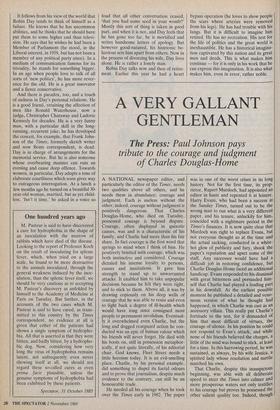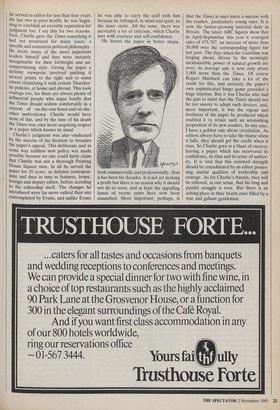A VERY GALLANT GENTLEMAN
The Press: Paul Johnson pays tribute to the courage and judgment of Charles Douglas-Home
A NATIONAL newspaper editor, and particularly the editor of the Times, needs two qualities above all others, and he needs them in abundance: courage and judgment. Each is useless without the other; indeed, courage without judgment is positively dangerous. That Charles Douglas-Home, who died on Tuesday, possessed courage is beyond dispute. Courage, often displayed in quixotic causes, was and is a characterstic of his family, and Charlie had more than his fair share. In fact courage is the first word that springs to mind when I think of him. He positively bristled with courage, which was both instinctive and considered. Courage dictated his intense loyalty to persons, causes and institutions. It gave him strength to stand up to unwarranted attacks. It enabled him to take unpopular decisions because he felt they were right, and to stick to them. Above all, it was by drawing copiously on his deep wells of courage that he was able to resist and even to fight back a degree of ill-health which would have long since consigned most people to permanent invalidism. Eventual- ly it overwhelmed even Charlie, but the long and dogged rearguard action he con- ducted was an epic of human valour which his friends will never forget. He died with his boots on, still in possession metaphor- ically, if not quite literally, of his editorial chair. God knows, Fleet Street needs a little heroism today. It is an evil-smelling place. Charlie, by his personal example, did something to dispel its foetid odours and to prove that journalism, despite much evidence to the contrary, can still be an honourable trade.
He needed all his courage when he took over the Times early in 1982. The paper was in one of the worst crises in its long history. Not for the first time, its prop- rietor, Rupert Murdoch, had appointed an editor in haste and repented it at leisure. Harry Evans, who had been a success at the Sunday Times, turned out to be the wrong man to run what is a very different paper, and his tenure, unluckily for him, coincided with a nightmare period in the Times's finances. It is now quite clear that Murdoch was right to replace Evans, but not everyone thought so at the time and the actual sacking, conducted in a white- hot glow of publicity and fury, shook the paper's reputation and upset some of the staff. Any successor would have had a difficult job in restoring confidence, but Charlie Douglas-Home faced an additional handicap. Evans responded to his dismissal with great bitterness and persuaded him- self that Charlie had played a leading part in his downfall. At the earliest possible moment he published a detailed and veno- mous version of what he thought had happened, in which Charlie was cast as an accessory villain. This really put Charlie's fortitude to the test, for it demanded of him that most difficult of virtues, the courage of silence. In his position he could not respond to Evan's attack, and while none of his friends believed the charges, a little of the mud was bound to stick, at least for a time. In this harrowing period, he was sustained, as always, by his wife Jessica, a spirited lady whose resolution and mettle matched his own.
That Charlie, despite this inauspicious beginning, was able with all deliberate speed to steer the Times into calmer and more prosperous waters not only testifies to his courage but proves he possessed the other salient quality too. Indeed, though he served as editor for less than four years, the last two in poor health, he was begin- ning to establish an enviable reputation for judgment too. I say this for two reasons. First, Charlie gave the Times something it had not possessed for many years: a specific and consistent political philosophy. He wrote many of the more important leaders himself and they were instantly recognisable for their forthright and un- compromising style. Giving the paper a definite viewpoint involved pushing it several points to the right and to some extent identifying it with certain Thatcher- ite policies, at home and abroad. This took courage too, for there are always plenty of influential people who argue loudly that the Times should wallow comfortably in a cocoon of on-the-one-hand-and-on-the- other ambivalence. Charlie would have none of this, and by the time of his death the Times was once more acquiring respect as a paper which knows its mind.
Charlie's judgment was also vindicated by the success of his decision to broaden the paper's appeal. This deliberate and in some way ruthless new policy was made possible because no one could fairly claim that Charlie was not a thorough Printing House Square man. In all he served the paper for 20 years, as defence correspon- dent and then in turn as features, home, foreign and deputy editor, before acceding to the editorship itself. The changes he introduced were far more radical than any contemplated by Evans, and unlike Evans he was able to carry the staff with him because he belonged, in mind and spirit, to the inner circle. All the same, there was inevitably a lot of criticism, which Charlie met with courtesy and self-confidence.
He leaves the paper in better shape, both commercially and professionally, than it has been for decades. It is not yet making a profit but there is no reason why it should not do so soon, and at least the appalling losses of recent years have now been staunched. More important, perhaps, is
that the Times is once more a success with the readers, particularly young ones. It is now the fastest-growing national daily in Britain. The latest ABC figures show that in April-September this year it averaged sales of 475,707, an increase of more than 50,000 over the corresponding figure for last year. The days when the Guardian was forging ahead, driven by the seemingly inexhaustible power of natural growth are over; its average sale is now only about 5,000 more than the Times. Of course Rupert Murdoch can take a lot of the credit for this, and certainly the paper's own sophisticated bingo game provided a huge impetus. But it was Charlie who had the guts to insist that the Times should not be too snooty to adopt such devices; and, more important, it was the vigour and liveliness of the paper he produced which enabled it to retain such an astonishing proportion of its new readers. In any case, I have a golden rule about circulation. As editors always have to take the blame when it falls, they should get the credit when it rises. So Charlie goes in a blaze of success, leaving a paper which has recovered its confidence, its élan and its sense of author- ity. It is vital that this renewed strength should be consolidated by an editor posses- sing similar qualities of leadership and courage. As for Charlie's friends, they will be relieved, in one sense, that his long and painful struggle is over. But there is an aching place in their hearts once filled by a true and gallant gentleman.























































 Previous page
Previous page